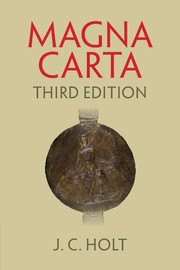Book contents
- Frontmatter
- Dedication
- Contents
- List of plates
- Preface to third edition
- Preface to second edition
- Preface to first edition
- Acknowledgements
- Abbreviations
- Introduction
- 1 The Charter and its history
- 2 Government and society in the twelfth century
- 3 Privilege and liberties
- 4 Custom and law
- 5 Justice and jurisdiction
- 6 Crisis and civil war
- 7 Quasi Pax
- 8 The quality of the Great Charter
- 9 The achievement of 1215
- 10 From distraint to war
- 11 The re-issues and the beginning of the myth
- Appendices
- 1 The meeting at Bury St Edmunds, 1214
- 2 Notification of Thomas count of Perche, February 1215
- 3 Triplex forma pacis
- 4 The ‘unknown’ charter
- 5 The Articles of the Barons
- 6 Magna Carta, 1215
- 7 Translations of the Charters
- 8 The Twenty-Five barons of Magna Carta, 1215
- 9 The date of the London treaty
- 10 The Oxford Council, 16–23 July 1215
- 11 Select documents illustrative of the history of Magna Carta, 1215
- 12 Magna Carta, 1225
- 13 Charter of the Forest, 1225
- 14 Liberties and perpetuity
- References
- Index
- Plate section
5 - The Articles of the Barons
from Appendices
Published online by Cambridge University Press: 05 July 2015
- Frontmatter
- Dedication
- Contents
- List of plates
- Preface to third edition
- Preface to second edition
- Preface to first edition
- Acknowledgements
- Abbreviations
- Introduction
- 1 The Charter and its history
- 2 Government and society in the twelfth century
- 3 Privilege and liberties
- 4 Custom and law
- 5 Justice and jurisdiction
- 6 Crisis and civil war
- 7 Quasi Pax
- 8 The quality of the Great Charter
- 9 The achievement of 1215
- 10 From distraint to war
- 11 The re-issues and the beginning of the myth
- Appendices
- 1 The meeting at Bury St Edmunds, 1214
- 2 Notification of Thomas count of Perche, February 1215
- 3 Triplex forma pacis
- 4 The ‘unknown’ charter
- 5 The Articles of the Barons
- 6 Magna Carta, 1215
- 7 Translations of the Charters
- 8 The Twenty-Five barons of Magna Carta, 1215
- 9 The date of the London treaty
- 10 The Oxford Council, 16–23 July 1215
- 11 Select documents illustrative of the history of Magna Carta, 1215
- 12 Magna Carta, 1225
- 13 Charter of the Forest, 1225
- 14 Liberties and perpetuity
- References
- Index
- Plate section
Summary
This title seems to be derived from a combination of the head of the document ‘Ista sunt capitula quae Barones petunt … ’, and the later endorsement ‘Articuli magne carte libertatum sub sigillo regis Johannis’. It is not used by Spelman, who heads the document ‘capitula super quibus facta est Magna Charta Regis Johannis’ or by Blackstone, who refers to the ‘articles or heads of agreement’. Richard Thompson refers to the ‘Articles of Magna Carta’. ‘The Articles of the Barons’ appears as a title in Stubbs's Select Charters and has become customary since.
Two hypotheses have usually been advanced in explanation of the Articles; first, that they were presented by the barons on 15 June and conceded by the king forthwith, and secondly that they were not drawn up until the 15th itself in the first general discussions between the two parties at Runnymede. Neither hypothesis is satisfactory. The first is inconsistent with the wording of the heading and of caps. 48 and 49, where the king's consent to the baronial demands is clearly stated, and with the probability that the document was drafted by a Chancery clerk. The second encounters the obvious difficulty of time. On this matter there was some inconsistency in McKechnie's arguments, for while he maintained that the amendment of the Articles into the form of the Charter and the engrossment of the latter formed the principal business of 16, 17, and 18 June, he also considered that the Articles were produced in the course of one single day, 15 June. That the process of amendment took several days is highly probable, but if this was so it is unconvincing to argue that the preliminary agreement of the Articles could have been produced on the first day of the discussions, for it was in the Articles that most of the major problems were first settled.
- Type
- Chapter
- Information
- Magna Carta , pp. 356 - 372Publisher: Cambridge University PressPrint publication year: 2015



